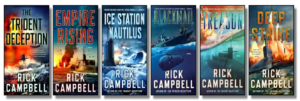Book Review | Author Rick Campbell: an exciting writer of naval and unconventional warfare
Reviewed by retired Commander Darlene Iskra, museum volunteer

Author Rick Campbell writes about what he knows best: submarine and special warfare. In his previous life he was a submariner, retiring as a Commander, with in-depth knowledge of war plans and policies he has woven all of this and more into his stories…unclassified of course. Uncannily, his story lines could be drawn straight from today’s headlines.
From post-World War II until the late 1980s, the US and USSR were in a Cold War. When the USSR fell apart in 1990, Russia, the main fuel behind the Soviet fire, had to sit back and lick its wounds. Rick Campbell’s books imagine what would happen if certain elements of the previous Soviet hierarchy and high-ranking military officers decided to take things into their own hands to bring Russia back to its previous rank on the world stage. Other likely scenarios are also explored…China, and terrorism, for example but are clearly based on current national security issues.
Many of these operations included submarine warfare as well as special operations scenarios, both of which USNUM volunteers might find interesting.
Campbell’s first novel, The Trident Deception (2014), centers around a rogue group imbedded in US intelligence organizations. With the capability of changing strategic nuclear codes, the group orders USS Kentucky to destroy Iran before Iran can destroy Israel. When the government learns of the false orders, it must take drastic action to prevent Kentucky from conducting the operation. The action is moving and suspenseful.
In his first book, we meet several characters that provide continuity to the series. One of the main characters is Captain Murray Wilson, a senior submarine sailor, who was tasked to stop Kentucky from executing her orders. We also meet Christine O’Conner, the National Security Advisor, and a member of the opposite party from the President, being appointed as someone who will speak truth to power. Kevin Hardison, Christine’s nemesis, is the Chief of Staff, consistently opposing Christine’s point of view.
In Empire Rising (2015), China has been building up her military for decades and plans to invade Taiwan. But that is only the start of the overall plan to take over the Pacific due to a recent accord that severely limits China’s access to oil and other resources. [Sounds a bit like what happened in the late thirties when Japan was faced with a similar problem, starting World War II in the Pacific.] There is an inkling of possible war, and Christine O’Connor is sent to Beijing to try to negotiate a deal. She is in Beijing when the war starts and is held prisoner. When the US sends the Pacific Fleet to defend Taiwan, China destroys it, having much better capabilities than the US had planned or anticipated. A plan involving our hero Captain Wilson on USS Michigan, a guided missile Trident class submarine, and the SEALS, embarked with Lt. Jake Harrison, is daring and risky. Christine manages to escape with the help of the CIA, and the subsequent intrigue, diplomacy, and military action will keep you reading through the night!
In his third book, Ice Station Nautilus (2016), the Russians have developed a new submarine and the US has assigned the fast attack submarine USS North Dakota to trail it and collect intelligence. This is important because the two countries are in the midst of negotiating a new arms treaty, but the Russians are not allowing inspection of the new submarine. As the Russian sub heads under the polar ice cap, they detect the American submarine, and in a radical evasive maneuver, the two submarines collide, sending them both to the bottom. The Americans immediately send a rescue mission, including a submarine, a group of specialists, including the National Security Advisor Christine O’Connor, and a SEAL team led by Jake Harrison, to set up camp-Ice Station Nautilus. The Russians also send a team of men and materials ostensibly to rescue their own men, but the Russian Special Forces (Spetsnaz) are really there to make sure the Americans do not get a look at the new submarine. The plan is to destroy the Ice Station camp leaving no survivors or traces of their actions. The result is a battle between Spetsnaz and SEALs, submarine against submarine, and the downed submariners struggling for their survival.
The fourth novel, Blackmail (2017), involves a Russian plot to strike against the United States which is at its weakest point in decades after the war with China. The Russian President, Yuri Kalinin (introduced in Ice Station Nautilus) plans to rebuild the old Soviet Union by moving to occupy a large number of the industrialized areas of the former USSR while blockading much of the world’s oil and natural gas supply. They have also guaranteed success by wiring every major oil and natural gas pipeline with explosives, blackmailing the international community not to intervene. If anyone moves against them, they will destroy them all.
SEAL teams to the rescue, with USS Michigan (Captain Murray Wilson in command) infiltrating the Russian blockades (in the Black, Baltic, and Mediterranean Seas), and sending the SEALs, including our man Jake Harrison, to secretly destroy all the boobytrapped pipelines. This gives the US President leverage against Russia. Christine is front and center, as the liaison between the US and Russia, and we find a bit of a romantic twist when Yuri, Russia’s President, sees Christine’s remarkable likeness to his recently deceased wife. Of course, the US prevails, but not without plenty of intrigue and non-settles issues between the two countries.
In Treason (2019), the top generals in the Russian military are determined to see her regain her role as a superpower. A radical plan is developed which would disable America’s nuclear strategic capability through software malware. However, President Kalinin refuses to allow it. His senior military advisor, General Andropov, successfully executes a military coup, imprisons the President, and executes the plan. With America’s nuclear defense compromised, they invade Ukraine with overwhelming force. The US has to determine how this was done and reverse it.
It just so happens that Christine was spending the weekend with Yuri Kalinin and manages to free the President and eventually get him aboard, you guessed it, USS Michigan. SEALS were heavily involved in the rescue, including Lt. Jake Harrison. I failed to mention earlier that Christine and Jake have a past, and in this book, Jake has to decide whether to save Christine or Yuri. I will not spoil the surprise, but both eventually survive, and Yuri takes back control of Russia with United States help. And oh, by the way, NCIS do find the American traitor who installed the malware.
Finally, the sixth novel in the series, Deep Strike (2021), deals with an American terrorist, a disgruntled former Navy SEAL, Lonnie Mixell, who wreaks international havoc by targeting the United States using a Russian submarine with nuclear weapons. The terrorist bribes the Russian Captain who needs money for his daughter’s illness. Thus Russia, while not complicit in the attack, does have high-ranking people helping in the plot to destroy the United States. The US discovers the plot and must act quickly to mitigate the plan.
Campbell weaves several love story lines in his books, but the most engaging one is between National Security Advisor Christine and the SEAL Lieutenant Harrison. They have a history from childhood, a romance in college, but Christine’s focus on her career derailed the romance, until Jake married another. In the meantime, Russian President Kalinin has also expressed an interest in Christine, but their positions at opposite spectrums of diplomacy make it for an interesting, if not impossible, relationship. Another ongoing plot line is the “trouble” Christine seems to find regardless of her status at the NSA. She has been beaten, kidnapped, shot, and left for dead. She finally changes jobs in Deep Strike to the CIA director, which the president hopes will keep her out of harm’s way. It probably will not, as it is fun to read the exploits of this kick-ass woman!
According to the author, Deep Strike is the first in a trilogy that will end with book 8. The secondary plot themes that will run through the trilogy include Mixell and his childhood friends and the Christine-Harrison storyline that has been running since Empire Rising (book 2). In books 7 or 8 Campbell promises to finalize the romantic impasse between the two.
Campbell describes his scenery beautifully, with so much detail that one can see the room, the countryside, or the inside of a submarine very clearly in your mind’s eye. His novels are exciting, fast acting, unexpected, full of action, and usually end with collateral damage, but with most of our heroes still living. For those of you who are familiar with submarine warfare, strategies, and tactics, he caveats that the descriptions of naval and submarine warfare, submarine operating procedures, and language are intentionally wrong for security reasons. Additionally, he has reduced “Navy-speak,” i.e., acronyms, technical details, and other military jargon, to keep the story moving and interesting to civilians who otherwise would not understand what is going on! Nevertheless, he keeps everything as close to real life as possible and writes suspenseful and page-turning novels.
Editor’s Note: Rick Campbell has compiled a “Submarines 101” resources to help his readers understand his books. The info is basic but thorough with a few inside jokes thrown in. http://www.rickcampbellauthor.com/styled/index.html#topic1
